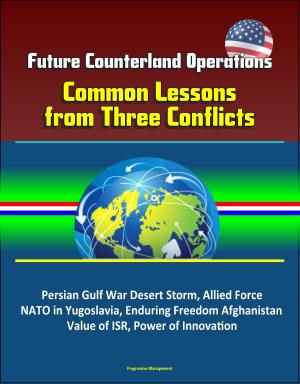Intelligence in Denied Areas: New Concepts for a Changing Security Environment - Ethnic Diasporas and Nongovernment Organizations (NGOs), Special Operations Forces (SOF), Terrorist Networks
Nonfiction, History, Military, Social & Cultural Studies, Political Science| Author: | Progressive Management | ISBN: | 9781311886613 |
| Publisher: | Progressive Management | Publication: | June 1, 2016 |
| Imprint: | Smashwords Edition | Language: | English |
| Author: | Progressive Management |
| ISBN: | 9781311886613 |
| Publisher: | Progressive Management |
| Publication: | June 1, 2016 |
| Imprint: | Smashwords Edition |
| Language: | English |
This excellent report has been professionally converted for accurate flowing-text e-book format reproduction. Russell Howard's paper focuses on intelligence operations within denied areas and how these operations today differ from those of the Cold War period. Today, the preeminent threat is transnational, violent terrorist groups that operate under the cover of failed or weak states, as well as under the civil protections afforded in western liberal democracies. Howard focuses on the operational environments in failed or weak states as he discusses ways to improve intelligence targeting and collection in these challenging areas.
The congressionally mandated 9/11 Commission highlighted shortcomings in United States intelligence capabilities. In particular, the commission emphasized the need to refocus the intelligence community to overcome institutional biases toward technical intelligence collection. Howard's paper agrees with this assessment and provides four areas for consideration to improve our ability to operate against transnational terror networks.
One area of consideration is using criminal networks to target terrorist networks. Howard makes a cogent argument that there is significant overlap between criminal and terrorist organizations. Targeting and manipulating criminals may significantly improve intelligence collection on terrorist activities. Traditionally, lawmakers have resisted using "tainted" intelligence sources, as evidenced by Congress' restrictions imposed in the 1990s on using sources with human rights violations. The reality is there is a nexus between criminal and terrorist networks and "wishing away" this linkage is not an appropriate policy—managing and taking advantage of the linkage is the right course of action.
Chapter 1 - The Enemy of My Enemy Is My Friend * Chapter 2 - Leveraging Diasporas * Chapter 3 - Marriage of Convenience: NGOs and U.S. Intelligence Agency Cooperation * Chapter 4 - SOF for Life: A Potential Intelligence Force Multiplier
This excellent report has been professionally converted for accurate flowing-text e-book format reproduction. Russell Howard's paper focuses on intelligence operations within denied areas and how these operations today differ from those of the Cold War period. Today, the preeminent threat is transnational, violent terrorist groups that operate under the cover of failed or weak states, as well as under the civil protections afforded in western liberal democracies. Howard focuses on the operational environments in failed or weak states as he discusses ways to improve intelligence targeting and collection in these challenging areas.
The congressionally mandated 9/11 Commission highlighted shortcomings in United States intelligence capabilities. In particular, the commission emphasized the need to refocus the intelligence community to overcome institutional biases toward technical intelligence collection. Howard's paper agrees with this assessment and provides four areas for consideration to improve our ability to operate against transnational terror networks.
One area of consideration is using criminal networks to target terrorist networks. Howard makes a cogent argument that there is significant overlap between criminal and terrorist organizations. Targeting and manipulating criminals may significantly improve intelligence collection on terrorist activities. Traditionally, lawmakers have resisted using "tainted" intelligence sources, as evidenced by Congress' restrictions imposed in the 1990s on using sources with human rights violations. The reality is there is a nexus between criminal and terrorist networks and "wishing away" this linkage is not an appropriate policy—managing and taking advantage of the linkage is the right course of action.
Chapter 1 - The Enemy of My Enemy Is My Friend * Chapter 2 - Leveraging Diasporas * Chapter 3 - Marriage of Convenience: NGOs and U.S. Intelligence Agency Cooperation * Chapter 4 - SOF for Life: A Potential Intelligence Force Multiplier















